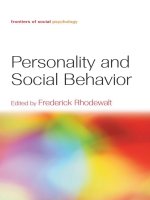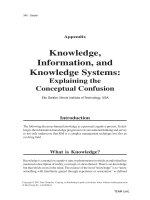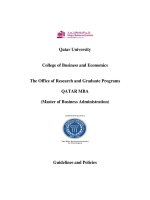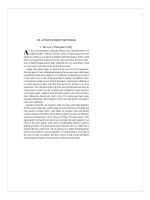Personality classic theories and modern research 6th chapter 7 cognitive and social conitive aspects of personality
Bạn đang xem bản rút gọn của tài liệu. Xem và tải ngay bản đầy đủ của tài liệu tại đây (257.27 KB, 35 trang )
Personality
Sixth edition
Chapter 7
Cognitive and SocialCognitive Aspects of
Personality
Copyright © 2016, 2012, 2009 Pearson Education, Inc. All Rights Reserved
Modules (1 of 2)
Introduction: Cognitive and Social-Cognitive Aspects of
Personality
7.1: Roots of Cognitive Approaches
7.2: Cognitive and Perceptual Mechanisms
7.3: George Kelly’s Personal Construct Theory
7.4: Social Intelligence
7.5: Explanatory Style as a Personality Variable
7.6: Julian Rotter’s Locus of Control Approach
Copyright © 2016, 2012, 2009 Pearson Education, Inc. All Rights Reserved
Modules (2 of 2)
7.7: Albert Bandura’s Social-Cognitive Learning Theory
7.8: Humans as Computers
Conclusion: Cognitive and Social-Cognitive Aspects of
Personality
Copyright © 2016, 2012, 2009 Pearson Education, Inc. All Rights Reserved
Learning Objectives (1 of 2)
7.1: Investigate different cognitive approaches to
personality
7.2: Analyze the mechanisms of expecting,
attending, and information processing
7.3: Express George Kelly's personal construct
theory
7.4: Investigate how the concept of social,
emotional, and multiple intelligence can be used to
understand behavior
Copyright © 2016, 2012, 2009 Pearson Education, Inc. All Rights Reserved
Learning Objectives (2 of 2)
7.5: Discuss the concept of explanatory style as a
cognitive personality variable
7.6: Analyze the work done by Julian Rotter
7.7: Describe Albert Bandura’s theory of socialcognitive learning
7.8: Evaluate the process of the creation of virtual
personalities
Copyright © 2016, 2012, 2009 Pearson Education, Inc. All Rights Reserved
Introduction: Cognitive and SocialCognitive Aspects of Personality
− Cognitive approaches to personality
− Social-cognitive aspects of personality
Copyright © 2016, 2012, 2009 Pearson Education, Inc. All Rights Reserved
7.1: Roots of Cognitive Approaches
Objective: Investigate different cognitive approaches to personality
− Beginning of cognitive psychology
− Influences on thinking
Copyright © 2016, 2012, 2009 Pearson Education, Inc. All Rights Reserved
7.1.1: Roots in Gestalt Psychology
− Overview
− Central tenets
Copyright © 2016, 2012, 2009 Pearson Education, Inc. All Rights Reserved
Figure 7.1: A Typical Gestalt Perceptual Figure
Gestalt theories claim that perception involves a search for meaning and that this meaning
can be an emergent property that is not found within any single element. Here, the triangle
that most people perceive “emerges” from the juxtaposition of incomplete circles; it exists in
the mind of the perceiver, but not in the picture itself.
Copyright © 2016, 2012, 2009 Pearson Education, Inc. All Rights Reserved
7.1.2: Kurt Lewin’s Field Theory
− Notion of “field”
− Focus
Copyright © 2016, 2012, 2009 Pearson Education, Inc. All Rights Reserved
7.1.3: Cognitive Style Variables
− Field-dependent style
− Field-independent style
Copyright © 2016, 2012, 2009 Pearson Education, Inc. All Rights Reserved
7.2: Cognitive and Perceptual
Mechanisms
Objective: Analyze the mechanisms of expecting, attending, and information processing
− Cognitive aspects of personality
− Piaget’s contributions
Copyright © 2016, 2012, 2009 Pearson Education, Inc. All Rights Reserved
7.2.1: Schema Theory
− Concept of “schemas”
− Activation of schema in given situations
Copyright © 2016, 2012, 2009 Pearson Education, Inc. All Rights Reserved
7.2.2: Categorization
− Overview
− Factors
Copyright © 2016, 2012, 2009 Pearson Education, Inc. All Rights Reserved
7.2.3: Control of Attention
− Overview
− Variations in people
Copyright © 2016, 2012, 2009 Pearson Education, Inc. All Rights Reserved
7.2.4: Individual Differences in Attention
− Attention-deficit/hyperactivity disorder (ADHD)
− Subtypes of ADHD
Copyright © 2016, 2012, 2009 Pearson Education, Inc. All Rights Reserved
7.2.5: Cognitive Influences on Interpersonal
Relationships
− Influences on people’s interactions
− Rejection sensitivity
Copyright © 2016, 2012, 2009 Pearson Education, Inc. All Rights Reserved
7.3: George Kelly’s Personal Construct
Theory
Objective: Express George Kelly's personal construct theory
− Overview
− Process
Copyright © 2016, 2012, 2009 Pearson Education, Inc. All Rights Reserved
7.3.1: Individuals as Amateur Personality
Theorists
− Kelly’s theorizing
− Uniqueness of Kelly’s theory
Copyright © 2016, 2012, 2009 Pearson Education, Inc. All Rights Reserved
7.3.2: The Role Construct Repertory Test
− Overview
− Modern social cognition approaches
Copyright © 2016, 2012, 2009 Pearson Education, Inc. All Rights Reserved
7.4: Social Intelligence
Objective: Investigate how the concept of social, emotional, and multiple intelligence can
be used to understand behavior
− Overview
− Emotional intelligence
Copyright © 2016, 2012, 2009 Pearson Education, Inc. All Rights Reserved
7.5: Explanatory Style as a Personality
Variable
Objective: Discuss the concept of explanatory style as a cognitive personality variable
− Explanatory style
− Variations in perspective
Copyright © 2016, 2012, 2009 Pearson Education, Inc. All Rights Reserved
7.5.1: Optimism and Pessimism
− Optimistic style
− Pessimistic style
Copyright © 2016, 2012, 2009 Pearson Education, Inc. All Rights Reserved
7.5.2: Learned Helplessness and Learned
Optimism
− Learned helplessness
− Learned optimism
Copyright © 2016, 2012, 2009 Pearson Education, Inc. All Rights Reserved
7.6: Julian Rotter’s Locus of Control
Approach
Objective: Analyze the work done by Julian Rotter
− Social-cognitive theory
− Rotter’s approach
Copyright © 2016, 2012, 2009 Pearson Education, Inc. All Rights Reserved









